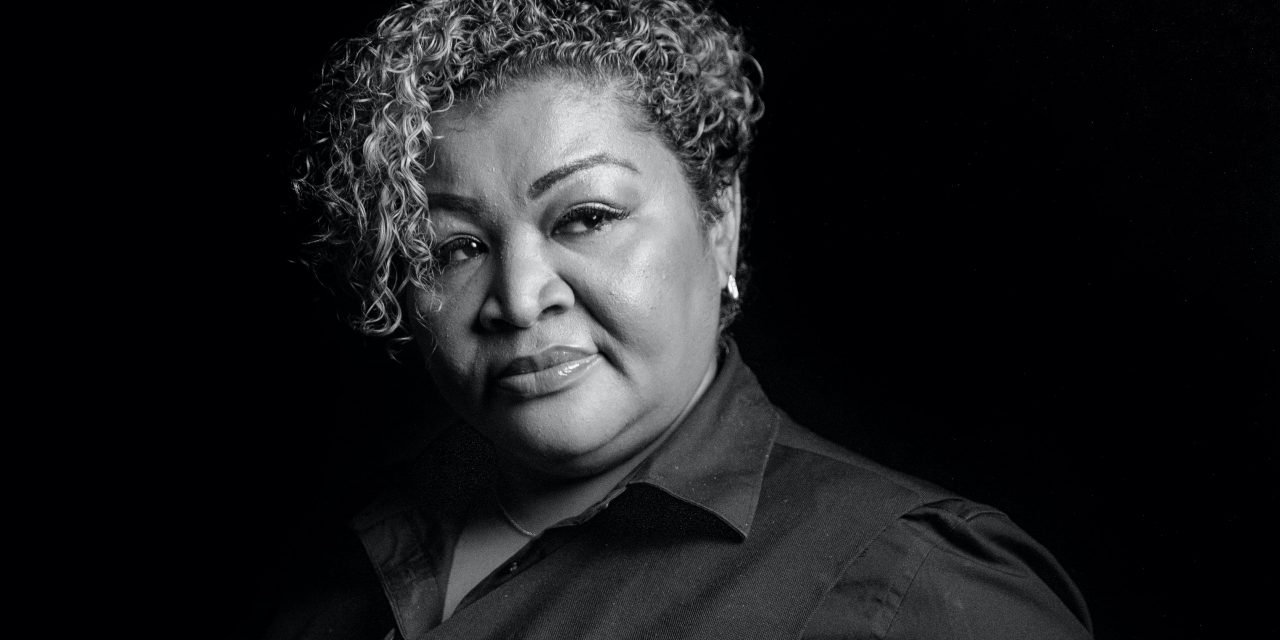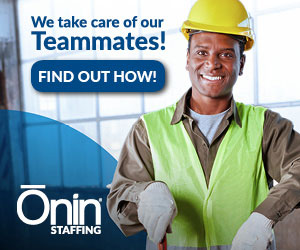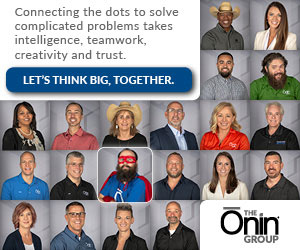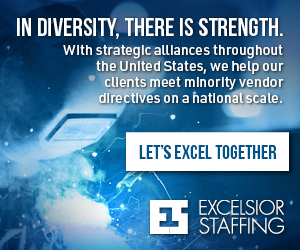Cheryl is an Onsite Manager with Ōnin who works at a client site known for its exceptional production quality standards. With high standards to maintain amid a worker shortage, high national employee turnover, and an expanding skills gap, Cheryl is tasked with managing Teammates and coaching them to success. The stakes are high, but Cheryl is up to the challenge thanks to her uncanny ability to read people and converse with them honestly and empathetically, no matter what walk of life they are in. From speaking with children with life-threatening illnesses to helping new workers understand what it takes to succeed at work, Cheryl is no stranger to intense, strange and downright uncomfortable conversations. Her ability to navigate these situations with grace and honesty has sharpened her leadership skills to a fine point, and I’m excited for you to see the caliber of person that we have at Ōnin.
In the history of Take5, we’ve highlighted many different kinds of leaders, but this interview was special because
Cheryl spends her days working directly with the workforce on the manufacturing floor. We so rarely hear from people on the frontlines, yet the insight from this hands-on perspective is invaluable. As leaders, we all have something to learn from Cheryl.
This is Take5
Shane: We’ll just jump right in. What has been your greatest accomplishment professionally up to this point in your career?
Cheryl: My greatest recent accomplishment professionally would be here with Ōnin working as the Onsite Manager for an internationally-respected client company. Becoming a leader in an environment that demands excellence in less than two years is a great accomplishment.
Thinking about my career as a whole, one of my greatest accomplishments was helping to start a private practice from the ground up called Pediatric Nephrology of Alabama. The children’s hospital nephrology director went off on his own and started a private practice, and he was the only private practice pediatric nephrologist in the South.
Essentially, we treated children who were diagnosed with renal failure and chronic kidney disease. In the founding days of the clinic, there were just three of us, the doctor, his wife who was the nurse, and myself. That was a great accomplishment. I was the face of the clinic, the person patients and their families saw before and after their visit with the doctor.
When we first began, there were many unknowns. I asked myself, am I going to get a check? But, it didn’t matter. I liked what I was doing. I enjoyed the patients and the families, and I just enjoyed the challenge.
Shane: That’s a role that requires so much empathy. The parents who you worked with must have been going through a crisis since their children are very sick. How did that experience impact you, and how does that experience translate to what you do now?
Cheryl: Customer service was number one. I wanted my service to be very friendly and provide comfort. Sometimes these parents were just told that their child needed to have a transplant or go on dialysis. Regardless of what the doctor’s diagnosis was or the results of the test, I needed to be the smiling face they saw when they came in for their appointment, and I needed to be the smiling face when they left.
The experience also put things into perspective. Most issues just don’t compare to having to bring your child into a nephrology center. It made me appreciate just the little things as well as the children themselves. Working with the children was great. They were often excited to see me and wanted to sit on my lap. I knew their family was going through a difficult journey. I recognized the importance of knowing the childrens’ names and remembering little things. I still have former patients who contact me to this day.
Shane: Those kinds of experiences can really leave an impact. I know, for myself, I spent a summer after my freshman year of college working at a camp for campers with special needs. That summer changed my life.
Cheryl: Those experiences do change you. They humble you and help you relate to people in a new way. There was one experience that really humbled me. I grew up with both my parents. My dad was the sole provider. My mom was a housewife. We were like a classic family on TV, like The Waltons or Leave it to Beaver in every way. My mom would have us bathed with the homework done and the food ready when my dad came home. I had that.
As an adult, I volunteered at an alternative school. One day in class, I said something that triggered a boy in the class. He was like, “Hold on. You’re not going to disrespect my clique like that. You say that one more time, and I’m going to have to beat you.” He was threatening me because he wanted to be bad and tough in front of everybody, but I told him, “No, you need to back down.”
I took him to the principal’s office and spoke to him in private there. I said, “Listen, what’s really going on with you?” At first, he told me nothing was going on with him, but I told him again, “You have something else going on. Talk to me because you don’t actually want to beat me up.” He broke down and started crying and told me how his mother was a drug addict and he had to take care of his sister, and how he was only in the alternative school because of tardiness.
I told him I understood and would send him some help. I told him, “You’re at a crossroads. If you go left, you’re going to prison, or you’re going to be dead. If you go right, then you’re going to make a turn that’s going to be better for your family, for your sister, and for everyone. All that aggression that you have, you can’t just hold that in. You need to talk to somebody. I’m available. Let’s talk about it.”
We exchanged numbers, and he called me. Today, he is an educator. He graduated from Alabama A&M three years ago. Recently, he called and said, “Thank you so much. No adult ever just stood up to me and told me what was what. I appreciate that.”
Before that took place, I hadn’t truly understood the kind of impact different painful life events could have on people. I saw those things on TV, but somebody just sitting there in my life talking to me about that situation was different. Before then, I had not wanted to understand that pain, but at that moment, I saw it. That situation really humbled me by making me understand what people are going through. Since then, I’ve worked with a lot of at-risk children.
Lately, I’ve worked with girls who have experienced extreme trauma. It humbles you. I understand what people are going through. Right now, we can be the changing moment in a person’s life. As an Onsite Manager, we can be the changing moment in a Teammate’s life. We can be that chance that some of them have never had before. Working at Ōnin with a great client partner that provides a career ladder to success is an opportunity. Every day, my attitude is, “Okay, let’s do it. Let’s be that one change. Let’s make this person want to be great.”
 Shane: What role does empathy play in leadership and in helping to get the job done? Do you see a massive difference between leaders who have the ability to be empathetic and meet people where they are and those who don’t?
Shane: What role does empathy play in leadership and in helping to get the job done? Do you see a massive difference between leaders who have the ability to be empathetic and meet people where they are and those who don’t?
Cheryl: I do see a difference. I’ve definitely watched some leaders out there that show a lot of empathy. We know policies and procedures are important. They are tools to prevent discrimination and promote fairness, so you have to enforce that policy as a leader. At work, you can’t show empathy in a way that allows you to make situational decisions just because you want to help someone, but there also aren’t always clear-cut solutions. You need to find that balance between empathy and policy when you’re making decisions. If all of our actions just reflect a check-the-box of the policy mentality, and we didn’t show empathy at all, about half of our workforce would probably leave. You can have empathy as well as balance the policy and procedure, and having a company culture that promotes that balance is ideal.
At the end of the day, the right solution still comes down to communication because with empathy comes communication. That balance allows you to say, “Listen, I understand your situation. I get it. Because of that, I’m going to sit on these two occurrences, but don’t let this be repetitive.” You have to look people in the eye and be honest with them while also understanding what they need from you.
Shane: You seem to really love your position as an Onsite Manager. Why do you like it so much?
Cheryl: I like Ōnin, I like our client company, I like people, and I know that Ōnin likes people — all of those factors make my position easy to do. I meet different people and have different relationships with our clients and our Teammates.
In my past experience, I enjoyed working in private practice, but it became stressful. I knew I needed time to rest, so I took a break from working. When I came back into the workforce, I thought, “I like people. I’m going to try serving people one more time.” In this job, I know I can change somebody’s day if I can be that one word of encouragement or that one smile because you don’t know what people are going through. Realizing the impact of simple, positive actions is what makes being an onsite leader so fun, in addition to every day being different.
Shane: Ōnin’s Teammates — the contingent workforce — are all over the map and in so many different stages of their life. How do you find yourself meeting people where they are and helping them stay in their positions and build careers?
Cheryl: You have to understand each person’s situation. Everybody has something going on, regardless of where they come from. For each Teammate at Ōnin, I give them a chance. When they come in Ōnin’s door, each person represents an opportunity for me to help them succeed. I always want to be friendly, to say hello, to be natural, and to just be myself. They can relate to that. If someone seems angry or upset, I try to say something silly to get their minds off the distraction and help them concentrate on success.
In some ways, I have a sales role. I’m selling opportunities to people, and I’m selling myself so people know they can trust me. When you know the product, you can sell the product, and I have a great instinct for knowing who people are, so I can cater to each person’s needs as a leader. At the end of the day, when you love what you do, it’s not hard to sell what you’re doing. It makes this job easy for me.
Shane: So, this is kind of the opposite question. What is your favorite failure, one that taught you an important lesson or put your life on a new trajectory?
Cheryl: I’ve only had four major jobs. At my second job, I just knew I was, hands down, the best at my position. I was doing finance and bookkeeping work, and I was a perfectionist at everything. If I was missing a single cent from a billion-dollar total, then I would track down that one cent and do it in less than ten minutes. I was moving through a huge workload and dealing with large, billion-dollar sums of money at incredible speeds, all while being accurate. Because I was so good at my job, I thought my job was completely secure and no one could touch me, but then my employer merged with another company. They announced that they were going to have to downsize, but I thought, “I don’t have to worry because I’m the best. I’m not replaceable.” Then, the new company told me that I was being laid off because of the merger, and they were replacing me with their people.
I learned one of the most difficult lessons that I have ever learned, that everybody is replaceable, but even so, you should still go to work and be the best. That changed my whole way of thinking. Give your company every reason not to let you go, but just know that you are still replaceable at the end of the day. Now my mentality is, “Listen, I know I’m replaceable, but also know that I’m still going to be so good that if you replace me, it’s going to take three people to do the job I did.”
Shane: That’s a lesson for all of us. Events like that can reshape our personalities. Can you talk through that a little bit and about that experience?
Cheryl: The layoff humbled me. I knew I was good, and I didn’t let the experience of being laid off take away from my sense of self-confidence, but the experience made me rethink a whole lot of things.
Now I have more compassion for situations that I didn’t even think about before. I was in my twenties then, and now I’m in my late forties, and the lesson has stuck with me.
Shane: That’s an excellent segue for this next question. Looking back and knowing what you know now, what is one piece of advice you would give your 25-year-old self?
Cheryl: Shut up and open your ears. I used to want the last word, but there’s a time to speak, and there’s a time to listen. If I had listened, then I would’ve understood life lessons that had already been playing out before me. It would have given me a longer-term perspective on making decisions because the decisions we make right now can lead to long-term consequences.
If you’re too busy talking to take time to listen, you can talk yourself out of a blessing you want in your life. Most of the time, we already know what to do, and we need to listen and act on it, versus sitting there and going back and forth. If you talk about things for too long, the opportunity will be gone.
Shane: If you were hiring your own replacement, what are a few of the must-haves you would look for in an Onsite Manager? If you were going to have to find your own replacement, what are some non-negotiables?
Cheryl: An onsite leader has to be honest, open and forthcoming. They need to be a little assertive but not too direct while also being humble. Honesty is the first and foremost characteristic, though. In this position, knowing how you present to other people is important too, especially the way you are presenting and giving information because we deal with a lot of information and need to be able to discuss a lot of topics with all kinds of different people.
My first conversation as a leader in this role was about hygiene with one of the Teammates — their personal hygiene wasn’t where it needed to be, and it was impacting the team. That conversation was difficult for me because I care about how people feel. I was so embarrassed to talk about such a sensitive topic, anthe Teammate was embarrassed too. It was very uncomfortable, but I knew something had to be done. How can someone know they need to make a change if you don’t address it with them?
At first, she reacted with tears, aggression, everything came, but then the Teammate told me she was struggling with a medical issue that was impacting the way she smelled. I asked her to let me help her find a hygiene method that
worked for her and her unique situation. I took her four uniforms home and washed them with some little scented beads. I left the clean uniforms for her in her locker. With that help and advice, she was able to change her habits, and her hygiene was better. The situation changed, and she changed, and it was better for everybody.
An onsite leader needs to know how to approach many sensitive situations. I actually have a stand-up mirror that I practice having conversations with Teammates in. I look at the reflection and ask myself, “I need you to have this conversation with the person you’re looking at in the mirror. How would you want it said to you? How would you say it so that it made a difference?”
Shane: The landscape in the workforce has changed a lot in 10 years. A lot of times, we’re talking to people who sit in offices about what’s happening in the workforce, not someone who is out there in the field, coming face-to-face with the workforce every day. You’ve seen the workforce change a lot in just over the last two years. What do you think, from your unique viewpoint, is on the horizon for workers in the industrial sector?
Cheryl: In my honest opinion, the work ethic of the people is different than when I started out. We have to be prepared for that change, which requires a different way of dealing with people. You have to be honest with today’s workers, and you have to be direct. If you look at the generation now that’s coming into the workforce, many of them haven’t received a lot of direct talks. They haven’t been told, “Look, this is how it’s going to be. This is what it is. I’m looking you in the eye, telling you what you need to do.” At Ōnin, we also make a point of being nice to people and showing respect. By working with the Teammates at our site, I have come to learn and love that they trust me because they know I tell them what’s what directly.
At the end of the day, it’s our job to sell the opportunity a job presents. At my job site, workers who stay with the program can build a career, and we’re currently presenting the job opportunity as a career instead of just another short-term job. With the job opportunities, the great benefits, and now the 401K program that is coming, Ōnin has a lot to offer workers. There’s a lot to sell to workers, in other words. I think workers can make the comparison between Ōnin, and all the great benefits, tools and opportunities we offer, and competitors who don’t offer those things. As employers though, beyond just giving great benefits and room for salary and professional growth, we need to have sensitivity to the reality of what’s going on in the lives of workers and the reality at play in the greater workforce.
Shane: I think, if nothing else, Covid-19 has made a lot of people realize how fragile and short life really is. Have you seen the mindset of workers shifting?
Cheryl: I’ve seen a shift in worker mentality for everyone — from people who mainly work in the office to those who are on the floor. There’s a greater expectation of work-life balance. Many people took off some time with Covid in 2020, and they actually got to experience parts of life they were missing. For instance, maybe a father got to see his child walk for the first time, whereas, if he was working, he would’ve missed that. I’ve seen a lot of people leaving the workforce because they feel like they’re missing out on a whole lot of opportunities with their family and other life events.
Prior to Covid-19, I saw a lot of people working to support their families. Now, those people want more flexibility to be with family in addition to work.
Today, I see more people being recruited who don’t have a family — they are just looking to support themselves and their lifestyle.
Shane: There are a lot of perceptions flying right now — many of them negative. Workers have misperceptions about employers, and company leaders have lots of misperceptions about the employees. At Ōnin, the solutions we have implemented to fix these misconceptions are always based on one idea: communication.
Cheryl: Communication is a huge contributor to everyone’s success and the best way to solve an issue within an organization. If you don’t communicate, if you don’t say what needs to be said, then how can anyone address the issue?
So many issues are caused by one of two communication issues. Many times, companies give people so much information up front and at once that the employees can’t process it, remember it, or understand what it means.
I’ve seen this over and over again. I’ve also seen companies giving employees information, but then the information isn’t reinforced or talked about ever again. If something is important, you need to make sure it stays part of the discussion.
Another big issue is that employees often don’t communicate their needs. Employees need to communicate with their leaders if they have an issue, from needing more training to making sure their contact information is up to date.
Employees need to feel empowered to say what they need or discuss a problem. If the employee feels like their leader is intimidating or not on their side or disinterested, they won’t communicate, and that’s a problem.
As a leader, you need to take an interest to find out what an employee’s situation is. Learning their names and walking the floor is invaluable. Say hey, and get to know them. If you struggle with names, make yourself a cheat sheet.
As leaders in the plant, we need to do everything to open communication. Lots of companies like to say they have an open-door policy, but do they really? As leaders on the floor, do we make employees feel comfortable enough to open that door? People are aware of reality. If they come to a door and they don’t feel welcomed, they’re not going in. They are going to keep on walking, and their issue won’t be addressed in a productive setting. My goal is to make it okay for someone to speak honestly with me. I want to be someone they are comfortable enough to talk to.
Shane: Manufacturing — and the rest of the world — is in a little bit of a recruiting crisis. You see the end result of that crisis. In your estimation, how can companies set themselves up for success to get the right people in the door?
Cheryl: It’s interesting because many of the workers I see coming to work are not the ones who will stay at the job long-term. Many of today’s workers just look at an opportunity as just a job that will give them money for the short term as opposed to a long-term career.
Some jobs are just jobs, but we are being intentional about helping people have a career and have all the perks that go with it. We are trying to help change these worker’s mentalities. We are basically saying, “Yes, this is a job, but if you want to continue on this path, you can upgrade your life.”
One thing I enjoy seeing is Teammates who understand they can actually have a career at Ōnin. Right now, we have a Teammate currently on site who is 62 years old. He’s been with us for several years. I’ve asked him what his plans are, and he told me, “I’m retiring with Ōnin.” I pressed him to see if he wanted to shift somewhere else, but he said, “Miss Cheryl, I just see it. Y’all come down, you talk to us, you show interest in us, we get these text messages from Ōnin keeping us in the loop, and people respond to me. It’s just not an automated thing. I just want to be at Ōnin.” He has a wife. He has a house. He’s not fully retirement age yet, and he’s working the rest of his career out with us.






